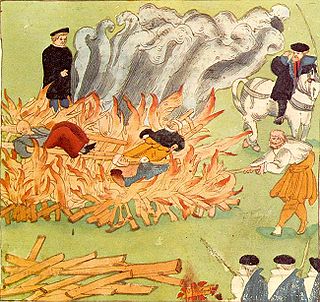Related Research Articles

Witchcraft, as most commonly understood in both historical and present-day communities, is the use of alleged supernatural powers of magic, generally stereotyped as doing harm or evil. A practitioner of witchcraft is a witch, though men may sometimes be referred to as a warlock. The belief in witchcraft has been found in a great number of societies worldwide. Anthropologists have applied the English term "witchcraft" to similar and related beliefs in occult practices in many different cultures, and societies that have adopted the English language have often internalised the term.

A witch-hunt, or a witch purge, is a search for people who have been labeled witches or a search for evidence of witchcraft. The classical period of witch-hunts in Early Modern Europe and Colonial America took place in the Early Modern period or about 1450 to 1750, spanning the upheavals of the Reformation and the Thirty Years' War, resulting in an estimated 35,000 to 50,000 executions. The last executions of people convicted as witches in Europe took place in the 18th century. In other regions, like Africa and Asia, contemporary witch-hunts have been reported from sub-Saharan Africa and Papua New Guinea, and official legislation against witchcraft is still found in Saudi Arabia and Cameroon today.

Hamilton Academical Football Club, often known as Hamilton Accies, or The Accies, is a Scottish football club from Hamilton, South Lanarkshire who currently compete in Scottish League One, having been relegated from the 2022–23 Scottish Championship. They were established in 1874 from the school football team at Hamilton Academy and remain the only professional club in British football to have originated from a school team. Hamilton have won the Scottish Challenge Cup three times and have finished runners-up in the Scottish Cup twice. The club currently play their home games at New Douglas Park.

Paisley is a large town situated in the west central Lowlands of Scotland. Located north of the Gleniffer Braes, the town borders the city of Glasgow to the east, and straddles the banks of the White Cart Water, a tributary of the River Clyde.

Sectarianism in Glasgow takes the form of long-standing religious and political sectarian rivalry between Catholics and Protestants. It is particularly reinforced by the fierce rivalry between Celtic F.C. and Rangers F.C., the two largest Scottish football clubs sometimes referred to as the Old Firm, whose support base is traditionally predominantly Catholic and Protestant respectively. A 2003 report for Glasgow City Council indicated that people clearly believe "sectarianism is still prevalent in Glasgow", but that members of the public were divided on the strength of the relationship between football and sectarianism.

The Battle of Glenlivet was a Scottish clan battle fought on 3 October 1594 near Glenlivet, Moray, Scotland. It was fought between Protestant forces loyal to King James VI of Scotland who were commanded by Archibald Campbell, 7th Earl of Argyll, against Catholic forces who were commanded by George Gordon, 6th Earl of Huntly, and Francis Hay, 9th Earl of Erroll. The Catholics won a decisive victory in the battle, but in the aftermath were subdued by King James.

The Paisley witches, also known as the Bargarran witches or the Renfrewshire witches, were tried in Paisley, Renfrewshire, central Scotland, in 1697. Eleven-year-old Christian Shaw, daughter of the Laird of Bargarran, complained of being tormented by some local witches; they included one of her family's servants, Catherine Campbell, whom she had reported to her mother after witnessing her steal a drink of milk.

Orange marches are a series of parades by members of the Orange Order and other Protestant fraternal societies, held during the summer months in various Commonwealth nations, most notably Ulster. The parades typically build up to 12 July celebrations marking Prince William of Orange's victory over King James II & VII at the Battle of the Boyne in 1690.
The Great Scottish Witch Hunt of 1597 was a series of nationwide witch trials that took place in the whole of Scotland from March to October 1597. At least 400 people were put on trial for witchcraft and various forms of diabolism during the witch hunt. The exact number of those executed is unknown, but is believed to be about 200. The Great Scottish Witch Hunt of 1597 was the second of five nationwide witch hunts in Scottish history, the others being The Great Scottish Witch Hunt of 1590–91, The Great Scottish Witch Hunt of 1628–1631, The Great Scottish witch hunt of 1649–50 and The Great Scottish Witch Hunt of 1661–62.
Events from the year 2013 in Scotland.

In early modern Scotland, in between the early 16th century and the mid-18th century, judicial proceedings concerned with the crimes of witchcraft took place as part of a series of witch trials in Early Modern Europe. In the late middle age there were a handful of prosecutions for harm done through witchcraft, but the passing of the Witchcraft Act 1563 made witchcraft, or consulting with witches, capital crimes. The first major issue of trials under the new act were the North Berwick witch trials, beginning in 1590, in which King James VI played a major part as "victim" and investigator. He became interested in witchcraft and published a defence of witch-hunting in the Daemonologie in 1597, but he appears to have become increasingly sceptical and eventually took steps to limit prosecutions.
Events from the year 1962 in Scotland.

The 1594 trial of alleged witch Allison Balfour or Margaret Balfour is one of the most frequently cited Scottish witchcraft cases. Balfour lived in the Orkney Islands of Scotland in the area of Stenness. At that time in Scotland, the Scottish Witchcraft Act 1563 had made a conviction for witchcraft punishable by death.
Margaret Bane also called Clerk, was a Scottish midwife and prominent victim of The Great Scottish Witch Hunt of 1597.

Witchcraft in Orkney possibly has its roots in the settlement of Norsemen on the archipelago from the eighth century onwards. Until the early modern period magical powers were accepted as part of the general lifestyle, but witch-hunts began on the mainland of Scotland in about 1550, and the Scottish Witchcraft Act of 1563 made witchcraft or consultation with witches a crime punishable by death. One of the first Orcadians tried and executed for witchcraft was Allison Balfour, in 1594. Balfour, her elderly husband and two young children, were subjected to severe torture for two days to elicit a confession from her.

The Pittenweem witches were five Scottish women accused of witchcraft in the small fishing village of Pittenweem in Fife on the east coast of Scotland in 1704. Another two women and a man were named as accomplices. Accusations made by a teenage boy, Patrick Morton, against a local woman, Beatrix Layng, led to the death in prison of Thomas Brown, and, in January 1705, the murder of Janet Cornfoot by a lynch mob in the village.

Margaret Aitken, known as the Great Witch of Balwearie, was an important figure in the great Scottish witchcraft panic of 1597 as her actions effectively led to an end of that series of witch trials. After being accused of witchcraft Aitken confessed but then identified hundreds of women as other witches to save her own life. She was exposed as a fraud a few months later and was burnt at the stake.
Louise Yeoman is a historian and broadcaster specialising in the Scottish witch hunts and 17th century Scottish religious beliefs.
Murphy Bailey Walker is a Scottish professional rugby union player who plays as a prop for United Rugby Championship club Glasgow Warriors and the Scotland national team.
Witches of Scotland was a campaign for legal pardons and historic justice for the people, primarily women, convicted of witchcraft and executed in Scotland between 1563 and 1736. A pardon and an apology was made on 8 March 2022. The aim was also to establish a national memorial for the convicted from the Scottish parliament.
References
- ↑ "The woman who stood up to a witch-hunt". BBC News. 10 November 2019. Retrieved 26 November 2021.
- 1 2 "Glasgow brought down fraudulent witch hunter". Glasgow Times. Retrieved 26 November 2021.